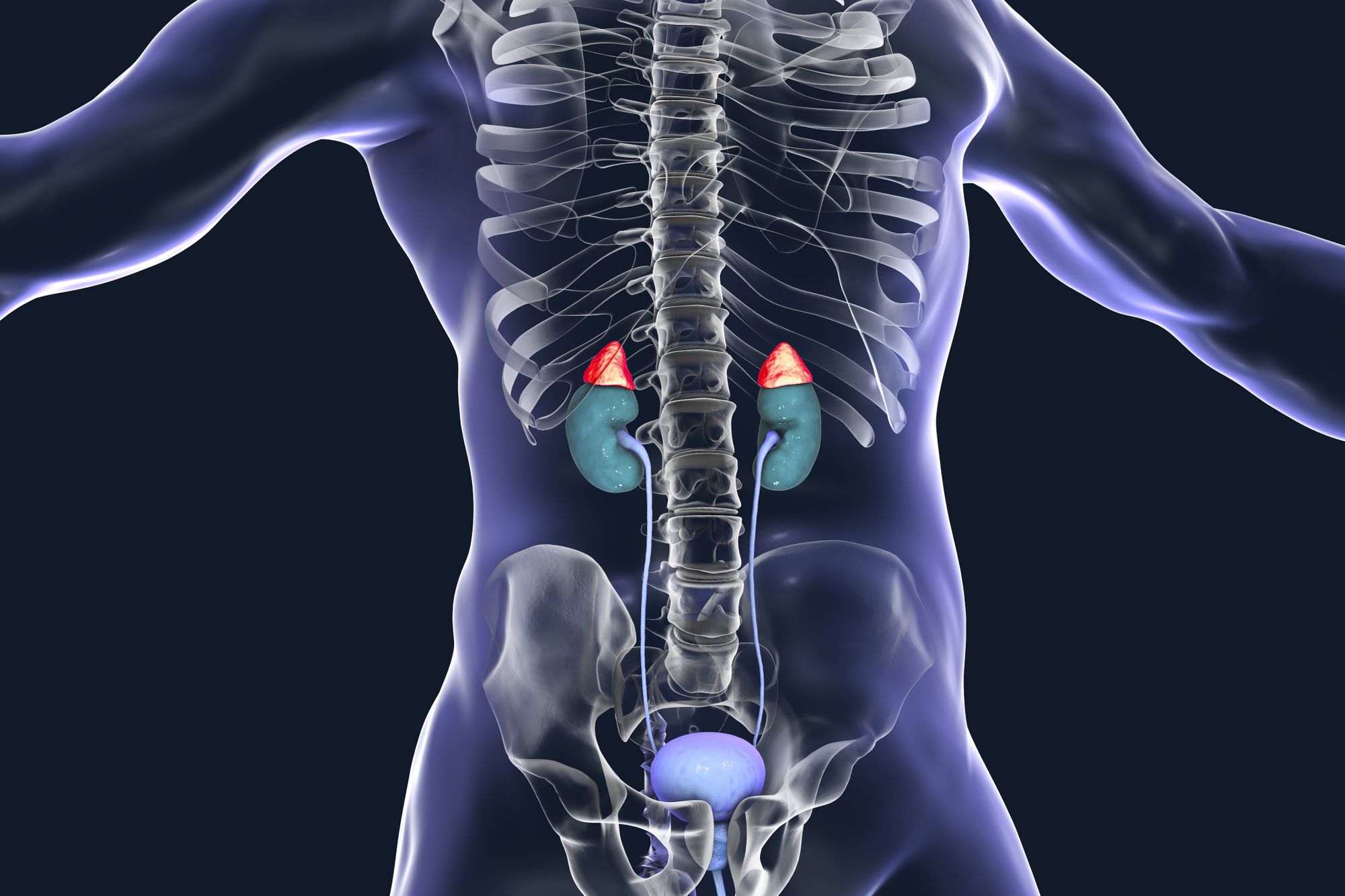Congenital Adrenal Hyperplasia (also known as CAH disease) is a group of rare inherited autosomal recessive disorders that impact the functioning of the adrenal glands.
The adrenal glands (also referred to as suprarenal glands) are located at the top of both kidneys. These glands are responsible for the secretion of hormones that regulate a variety of important body processes and systems, including metabolism, blood pressure, responses to stress, the immune system, and several others.
CAH disease is caused by abnormalities in the enzymes that are necessary to secrete the steroid hormones cortisol (and in frequent cases, also aldosterone). These abnormalities occur due to genetic mutations and give rise to an insufficiency of certain enzymes, such as 21-hydroxylase. A shortage of these vital enzymes cause the adrenal glands to overproduce other hormones known as androgens (also referred to as “male sex hormones”). An overproduction of androgens leads for a variety of symptoms to appear, which include abnormal genital development in infant girls and impaired fertility in both women and men.
Around 90% of CAH cases occur due to the deficiency of the 21-hydroxylase (21-OHD) enzyme, which is the most common form of CAH disease. The incidence rates of this form are between 1 in 10,000 to 1 in 15,000 people in the United States and Europe.
While CAH affects people of all races and ethnicities, it is more common among Yupik Eskimos, Ashkenazi Jews, and people of Italian, Hispanic or Slavic descent.
There are two major types of CAH:
● Classic CAH (CCAH)- This is a more rare and severe form of the disease, and is typically detected during infancy. Around two-thirds of Classic CAH patients have what’s known as the salt-wasting form, and one-third of patients have what’s referred to as the simple-virilizing form.
● Non-Classic CAH (NCCAH) - This form of the disease may not be evident in patients until later in childhood or in early adulthood. It is the milder and more common form of CAH.
While there is no cure for this disease, most patients can lead normal lives with a suitable congenital adrenal hyperplasia treatment.
Classic Congenital Adrenal Hyperplasia Treatment
Medication
Infants with Classic CAH typically start treatment with medications soon after birth, in order to diminish the effects of CAH disease on their development and health. Classic CAH is treated with steroid medications that work to replace low levels of hormones, and there are no CAH-specific medications approved by the FDA as of now. Patients with Classic CAH take steroid medications throughout the duration of their lives, and if treatment is discontinued, it will cause symptoms to appear again.
Steroid Medications Differ Based On The Development Stage:
● Infants and children are typically treated with a form of cortisol which is called hydrocortisone
● Adults are treated hydrocortisone, dexamethasone, or prednisone, which also work to restore cortisol to normal levels
● In addition, patients with the salt-wasting form of Classic CAH are treated with another medication called fludrocortisone, which works to replace aldosterone.
Under the conditions of stress, the body needs more cortisol for normal functioning, which may require an increase in the treatment dose during those times.
Examples of stress during which Classic CAH patients may require an increased treatment dose include:
● If undergoing surgery
● After sustaining a significant injury
● Being ill and having a high fever
Since cortisol levels in patients can fluctuate depending on the time in their life or due to mental or physical activities, the medication dose to replace cortisol can be higher or lower than what is needed by the patient. If the medication dose is too high, it can lead to the development of Cushingoid features.
Cushingoid features Include:
● Increase in body weight
● Decreased pace of growth (in children); short stature (adults)
● High blood pressure
● High blood sugar
● Stretch marks
● Bone loss
● Rounded face
If you are a CAH patient (or a guardian of someone with CAH) and these symptoms appear, notify your medical care provider so they can change the medication dose for your treatment.
It is also recommended that people with Classic CAH wear a medical identification necklace or bracelet that reads “adrenal insufficiency, requires hydrocortisone” in order to inform medical professionals if there is a medical emergency.
In addition, parents or guardians of children with CAH need to know how to administer a hydrocortisone injection in case of an emergency.
Finding An Endocrinologist With A Specialty In CAH
One of the first and preliminary steps towards a treatment plan for patients or parents of children with CAH disease is finding a health care provider with a specialty in dealing with CAH - an endocrinologist.
Below Are Some Databases For Finding An Endocrinologist In Your Area:
● Hormone Health Network’s Endocrinology Directory - Hormone Health Network is the public affiliate network of The Endocrine Society. The directory contains over 6,500 endocrinologists from all over the world, and you can use their targeted filtering system to find a CAH specialist that is as close as possible to you.
● American Association of Clinical Endocrinology (AACE) - This association has more than 5,700 endocrine-focused clinical members, affiliates, and partners as members. Their directory allows you to enter your zip code and find the nearest endocrinologist to you as well as describes each doctor’s specialties.
Clinical Trials and Investigational Therapies For Classic CAH
At the moment, there are no non-steroidal FDA approved treatments for patients living with classic CAH. However, there are current clinical trials that are in the process of evaluating investigational drug treatments such as CRF1 antagonists to determine if this class of medications is beneficial to patients with classic CAH. This new class of non-steroidal investigation treatments has the potential to lower the excess androgen production in patients with classic CAH.
If you or a loved one live with congenital adrenal hyperplasia, you can learn more about joining these late-stage clinical studies HERE and the Spruce sponsored study:
https://www.clarahealth.com/studies/cahmelia
Additional Resources For Congenital Adrenal Hyperplasia Treatment
● CARES Foundation (Congenital Adrenal Hyperplasia Research, Education & Support) - this is a non-for-profit organization that has an aim to improve the lives of patients (or parents of children) with congenital adrenal hyperplasia and seeks to promote quality health care through their efforts of patient advocacy, education, research and support
● The Hormone Health Network’s Patient Guide For Congenital Adrenal Hyperplasia
● CAH: The Facts You Need To Know - a fact sheet by the National Adrenal Diseases Foundation that covers the diagnosis, treatment and prenatal therapy for CAH



